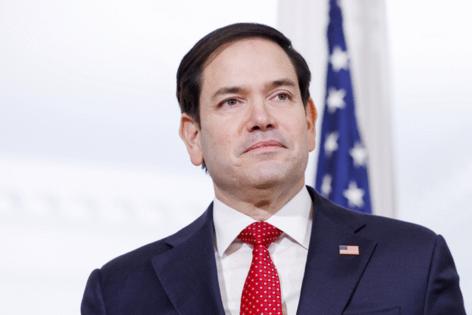Eastern Caribbean, Bahamas leaders to meet with Rubio in Washington on Tuesday
Published in News & Features
Two months after Secretary of State Marco Rubio met with a half-dozen Caribbean leaders in his first official visit to the region, more heads of government will get a chance to air their concerns.
The prime ministers of six eastern Caribbean nations — Antigua and Barbuda, Dominica, Grenada, Saint Kitts and Nevis, Saint Lucia and Saint Vincent and the Grenadines — along with The Bahamas will meet with Rubio in Washington on Tuesday.
Discussions are expected to include a host of regional concerns on the part of the United States such as border security and countering illegal immigration. Others are at the top of the agenda for the prime ministers, some of which they believe did not get sufficient airing in March when Rubio flew to the English-speaking region and met with the prime ministers of Jamaica, Barbados and Trinidad and Tobago and the new head of Haiti’s presidential council.
Now it’s the turn of the other leaders, who weren’t part of the discussions but who, along with Belize and the British Overseas Territory of Montserrat, make up the 15-member regional Caribbean Community bloc known as CARICOM.
“I don’t think we are going to have any sets of controversial issues,” Ralph Gonsalves, the prime minister of St. Vincent and the Grenadines, told the Miami Herald on Monday as he prepared to leave his twin-island nation for the meeting, scheduled to start at 3 p.m. Tuesday. “I think it makes sense for us to look for spaces where our interests can be accommodated.”
For Gonsalves, these include “practical issues like security, guns and bullets coming out of the U.S., assets like Coast Guard, disaster preparedness, disaster management and making sure we have some good open channels to bring issues up.”
Gonsalves also remains concerned about regional banks’ arrangements with U.S. financial institutions. The intermediary relationship that allows banks in different countries to be connected have long been under threat due to tightened U.S. financial restrictions, which have forced the closure of some banks in the Caribbean, limiting the ability of their U.S.-based nationals to send remittances back home.
In addition to Gonsalves, the other prime ministers expected to be present are Gaston Browne of Antigua and Barbuda; Philip Davis of The Bahamas; Roosevelt Skerrit of Dominica; Dickon Mitchell of Grenada; Terrance Drew of Saint Kitts and Nevis and Philip J. Pierre of Saint Lucia.
Not taking part in the talks: Belize Prime Minister John Briceño. Rubio spoke to him last week after his March 12 re-election. State Department spokesperson Tammy Bruce said that during the conversation Rubio reaffirmed the importance of the U.S.-Belizean partnership and congratulated him on his reelection. He recognized Belize’s significant efforts to counter illegal immigration, support Haitian security efforts, and combat transnational organized crime, Bruce said.
Rubio also thanked Belize for its efforts as part of the Kenya-led Multinational Security Support mission to Haiti, though the country recently pulled its two soldiers and is reassessing its involvement in Haiti’s anti-gang security fight.
During Rubio’s meeting in Jamaica in March, there was heavy focus on Haiti, which Gonsalves, a vocal supporter of the troubled nation, believes will also come up in Tuesday’s talks after CARICOM and the State Department last month denounced maneuvers by armed gang leaders and others to try to overthrow the country’s transitional government. Others in the region also expect China’s growing influence in the Caribbean, as well as Cuba’s controversial medical brigades program, which exports medical professionals, to also come up in the talks. Rubio earlier this year announced an expansion of visa restrictions to government officials who participate in the Cuba program, which he describes as “forced labor.”
At the time of the Jamaica meeting, the White House’s sweeping tariffs had not yet been unveiled. It is also top of the agenda for leaders after most of the Caribbean was hit with a baseline 10% tariff on goods exported to the U.S.
Another matter of concern is the future of the Citizenship by Investment programs, which provides a path to citizenship by moneyed investors and is considered a lifeline to five eastern Caribbean economies. Leaders are concerned that it may be the reason some of their nations have been singled out in discussions by Trump administration officials about travel bans of their nationals.
Under the travel-ban proposal under discussion in Washington, Antigua and Barbuda, Dominica, St. Lucia, and St. Kitts and Nevis would be on the third tier, with an opportunity to be removed under certain conditions. Among the discussions: the acceptance of undocumented migrants who cannot be deported by the Trump administration to their own countries.
This idea is sure to get pushback by Caribbean leaders, who have already said they cannot accept non-nationals in their tiny nations that are already struggling with rising crime, the damaging effects of climate change and high debt.
“Our countries are too small for those things,” said Gonsalves whose nation, along with Grenada, is still recovering from a deadly hurricane last year.
©2025 Miami Herald. Visit at miamiherald.com. Distributed by Tribune Content Agency, LLC.







Comments